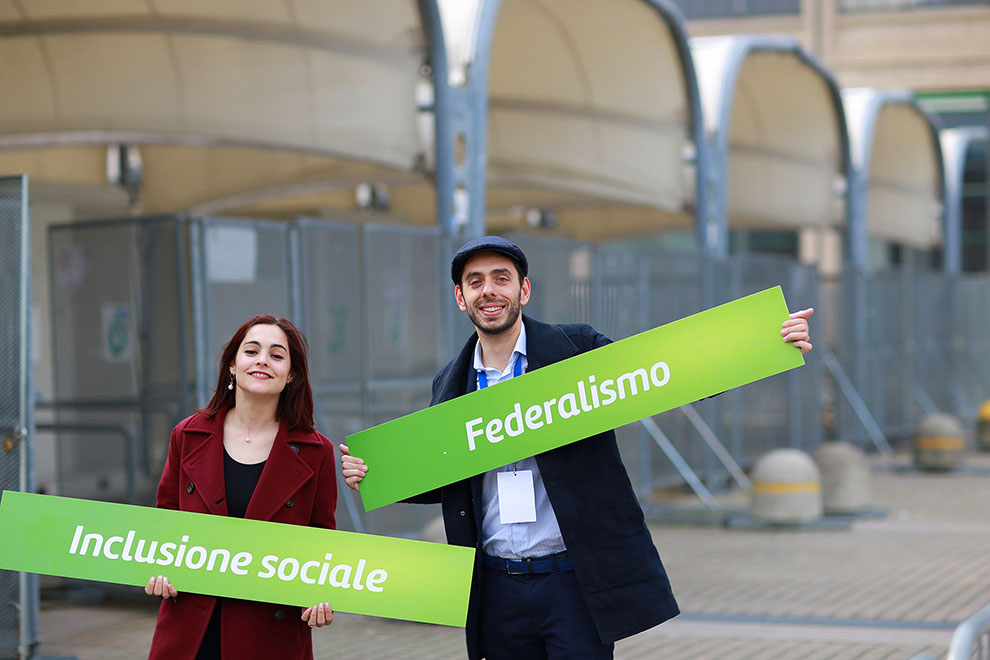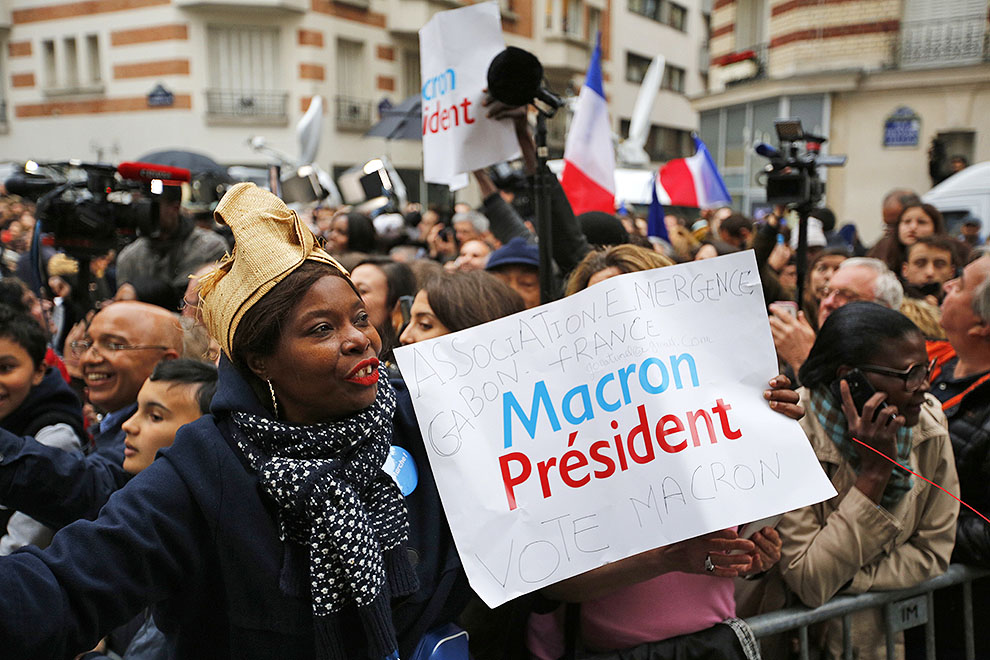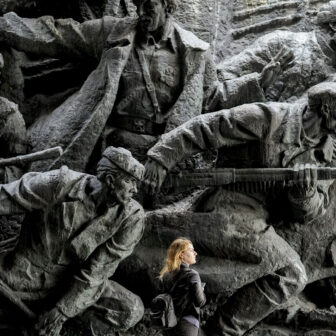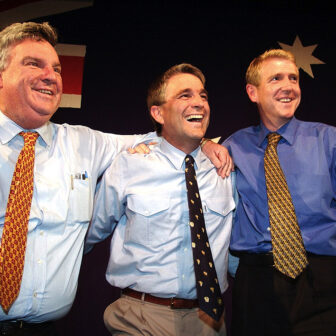If the Eurocrats have a spring in their step as they return to Brussels from their weekend retreats, it will come as no surprise. The political union that gave much of this continent seventy years of peace and prosperity has just dodged a bullet that could have brought down the whole operation.
And there should be no underestimating the sense of relief in this city: had Emmanuel Macron not won the second round of the French elections on Sunday, the far-right National Front would have put France’s membership of the European Union in doubt. And while the bloc will survive the departure of the United Kingdom, the loss of France, one of the club’s founding members, would have sounded the EU’s death knell.
But Macron’s convincing victory – and his long stroll for the cameras on Sunday night to address the crowd, to the strains of Beethoven’s Ninth Symphony – represents more than just a crisis averted. The election of the passionately pro-European former banker marks the beginning of the new narrative the EU had been looking for as it continues the fight against populist spot fires across the continent.
The rise of far-right, anti-EU forces is not inevitable – that’s the story the EU’s top brass will now be eager to tell. Even as Hungary’s xenophobic government challenges the legitimacy of the union, as Poland continues its war on judicial independence, as the forces of Euroscepticism triumph in Britain, Europe’s democratic values are proving resilient. The project has life in it yet.
With Macron in the Élysée Palace, the EU is back on the front foot. The union will see this as part of the same trend that saw pro-European, moderate parties dominate the March elections in the Netherlands (in spite of small gains by the far right), and in the same narrative thread that a year ago saw Austria elect Alexander Van der Bellen, the Green-aligned independent who cut short the seemingly unstoppable rise of the far right’s Norbert Hofer.
It might be a long bow, but even the electoral success of Serbia’s Aleksandar Vučić in April – a political leader from a non-EU country who actually wants to join the union – is part of the new paradigm.
Front and centre is, as always, Germany, where the federal election later in the year will see the pro-EU Chancellor Angela Merkel square off against none other than Martin Schulz, the former president of the European Parliament. A country that has faced the same angst over asylum seekers as its neighbours and has expressed little sympathy for the bloc’s debt-ridden southern members has largely sidestepped the political impact of anti-EU sentiment.
The EU may also take solace from the symbolism of Macron’s defeat of Marine Le Pen, the daughter and political heir of the National Front’s father figure, Jean-Marie Le Pen. A popular figure and a strong performer, Ms Le Pen is a member of the European Parliament and a critic of everything French supporters of the bloc hold dear: the common currency, the common market, and the free movement of people, goods and services. Le Pen’s defeat will resonate through the corridors of the European Parliament.
In retrospect, the National Front leader looked unusually vulnerable in last week’s televised debate – even as she launched some strong and personal attacks against Macron. If she had a clear set of policies ready to hit the ground running after Sunday’s poll, she was either unable or unwilling to articulate it. Macron, never a particularly strong performer, kept his cool and managed to avoid mistakes. That was all he needed to do.
If an ability to appear more credible than a far-right leader may not be that much of a political achievement, the fancy footwork required to dump his own personal baggage was undeniably masterful.
Macron is certainly an outsider by French political standards, where presidents usually come to national prominence after paying their dues in municipal politics and can flaunt a degree from the Ecole Nationale d’Administration, the training ground of those aspiring to public office. Yet you’d be hard-pressed to see him as anything other than a member of those elites so vilified in the recent US presidential election and Britain’s Brexit vote.
The newly elected president’s career has included a four-year stint with investment bank Rothschild, where he specialised in mergers and acquisitions. He joined the Socialist administration of president François Hollande as an adviser in 2012, and was appointed as France’s minister of economy and finance in 2014. It was not a natural fit – Macron was a self-styled economic liberal in a country where both the left and the right of politics see pro-business reforms as an Anglo-Saxon affectation which the state would do well to temper.
It soon became apparent that France’s Socialist Party was a sinking ship led by a president on a one-way road to an electoral hiding. (The party’s presidential candidate, Benoît Hamon, went on to secure just 6.3 per cent of the vote in the first round of the presidential poll on 23 April.) Macron decided to strike out on his own, kickstarting his own political movement: En Marche!, best translated as “On the move!”
Had Macron been running for public office in Australia, there would have been enough in his CV for the mother of all character assassinations. A fat cat from the top end of town; a political flip-flopper; an opportunist. Yet his distance from the major political parties served him well and made him possibly the best candidate to take on Le Pen – herself a child of the establishment who had nonetheless been able to position herself as the voice of France’s aggrieved social classes.
Macron emerged from the presidential election’s first round in pole position. The centre-right party Les Républicains secured 20 per cent of the vote, landing it in third place. Its leader, François Fillon, would have fared better had it not been for a scandal that revealed he had kept family members on his staff payroll, asking for no work in return. “Penelopegate” – named after Fillon’s Welsh wife – oozed a sense of entitlement on the part of established political elites that would be grist to the mill for any candidate able to claim the status of outsider – even a former banker. The times would suit Emmanuel Macron.
None of this should suggest that the EU thinks its problems are over. In spite of his economic liberal credentials, Macron will struggle to get his agenda through parliament: even after legislative elections in June, it will still be dominated by the same parties Macron has chosen to eschew. The EU will continue to clash with France over its public debt, which remains higher than the eurozone average, and the country’s penchant for championing local companies at taxpayer expense will continue to be challenged in EU courts.
Macron’s independence from the main parties may have got him elected, but those parties may yet deny him the chance to become a reformist leader like Gerhard Schröder, the centre-left German chancellor whose economic overhaul created the backdrop for the country’s current prosperity.
The EU might have bought itself some time and plenty of hope, but it can’t afford to drop its guard. There are populist storm clouds gathering in other parts of the EU facing elections – Italy, in particular, is facing a tough challenge to the pro-European stance that has dominated political thinking since the 1950s.
National elections in Italy are due by May, 2018, with the Eurosceptic Five Star Movement polling strongly and seen as a serious contender. Brussels sees Italy’s former prime minister, Matteo Renzi, as the EU’s best bet in the fight against anti-EU populist movements – both Five Star and the xenophobic Northern League. When the self-styled “demolition man” of Italian politics managed to reassert his authority of the centre-left Democratic Party late last month, the news was given a warm reception in Brussels.
The similarities between the Italian politician and Macron are cosmetic, but impossible to ignore. Both men are relatively young (Macron is thirty-nine; Renzi is forty-two); both men see themselves as outsiders in opposition to the elites dominating the party system.

Whole-heartedly pro-EU? Supporters of Matteo Renzi’s Democratic Party at a conference in Turin in March kicking off his campaign to return to the leadership. Francesco Pierantoni/Flickr
Renzi himself appears hopeful that some of Macron’s success will rub off. In a recent Facebook post, the Florentine politician whose crash-or-crash-through style entranced Italy in 2014, hammered away at the parallel. “Well then, Forza Macron!” Renzi wrote. “Let’s all walk alongside him. And as Emmanuel said this week, the day after [the vote] we will all be together to change Europe and give it a future worthy of the dream of the founding fathers.”
Yet, if he returns to the prime ministership, the Italian politician’s position on the EU is unlikely to be as supportive as that of Macron. Renzi’s vicious attack on Germany after a leaders’ summit in Bratislava last September revealed a willingness to outdo the populists in anti-EU rhetoric; Italy’s close economic relationship with Russia and its work behind the scenes to water down EU sanctions amount to a serious challenge to the bloc’s foreign policy.
Which means that if Renzi manages to cobble together a coalition after the next elections, his relationship with the EU will be problematic at best. What’s more, if the EU is hoping that Renzi is the right man to save it from Five Star, it might be deluding itself. Renzi’s feisty style may serve him well when taking on opponents within his own party, but coalition-building will be the name of the game in the wake of the next elections. That’s not his forte.
Italy’s president, Sergio Mattarella, is hoping that parliament will be able to agree on a new voting system before the vote – the current system is widely regarded as a dog’s breakfast. But whatever system is in place, it is likely to contain at least an element of proportional representation, meaning that no party is likely to emerge with an absolute majority. To stave off the Five Star threat, Renzi will have to reach out to other leaders.
Yet there won’t be many like-minded parliamentarians to choose from. The Northern League is now too far to the right to be an option, leaving the party of former prime minister Silvio Berlusconi as a choice Renzi will have to at least consider. But the very idea of a deal with Berlusconi would shock the Democratic Party’s already hostile left faction; it might also shock Renzi, whose once constructive relationship with Berlusconi came unstuck late last year in a most spectacular way.
Parliament’s vote for Mattarella to the largely ceremonial role of president in 2015 sidelined Berlusconi, who had expected to be consulted on the appointment. This centre-right politician later campaigned against Renzi’s proposed constitutional changes, which Berlusconi, given the right circumstances, could easily have supported.
Renzi’s position differs from Macron’s in another way, too. While France’s president-elect was able to rely on the support of voters horrified at the idea of right-wing nationalists taking power, the Five Star Movement is a different beast. The protest party, led by the charismatic comedian Beppe Grillo, is neither nationalistic nor particularly xenophobic. In fact, nationalism tends not to play too much of a role in Italian political discourse – possibly because Italians tend not to believe in the role of the state in the same way that the French do. So, while Macron was able to count on the support of voters who wanted to keep Le Pen out of power, Renzi won’t be able to commandeer that kind of solidarity.
Indeed, when you hear Grillo speak, he sounds like an old-school Italian lefty: vaguely anti-American, strongly against globalisation and in favour of protectionism, with a smattering of anti-science conspiracy theories. The one policy area in which his party moves firmly to the right is its intransigence on law and order, spurred by the belief that corrupt Italian politicians remain in power where they should be in jail.
The notion that the corrupt should be prosecuted and jailed would be less controversial in other countries. But Italy’s tragedy is not that there are so many criminals at large, but that there are so many innocent people in jail. In a society where the justice system is dysfunctional, the call to lock people up implies locking them up without access to a fair and timely trial. And this places the Five Star Movement to the right of the political spectrum.
But however outlandish the public utterances of Beppe Grillo and however strong his anti-EU beliefs, many Five Star politicians don’t see themselves as Eurosceptics – one of its members of the European Parliament described himself to me as “euro-cautious.” There’s a lot they don’t like about the EU, but that, they argue, doesn’t mean they want to upend the bloc entirely.
So while the Italian political landscape does not suggest that the EU can look forward to another political payoff comparable to the victory of Macron, it does give the EU reason to hope that Europe has reached the high-water mark of populism. If elected, Renzi will be recalcitrant but not revolutionary – and that’s something the EU can live with as it takes stock of what may prove to be a turning point in its history. •




